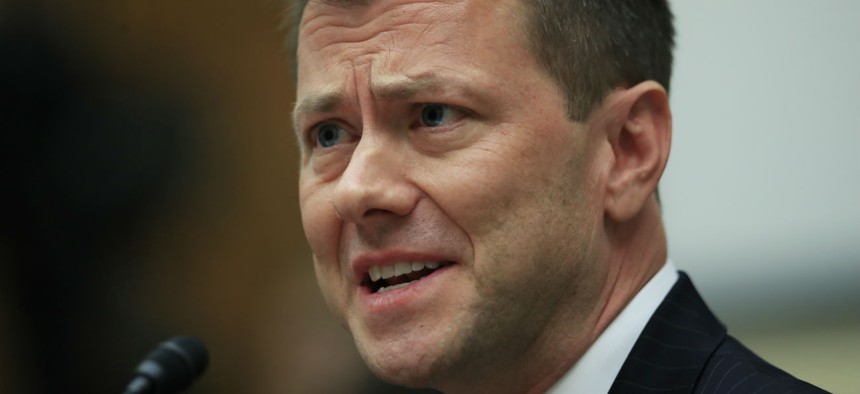Former FBI Agent Peter Strzok’s Lawsuit Highlights a Gray Area in the Hatch Act
The act does not address the use of government cell phones to send political text messages.
Former FBI Special Agent Peter Strzok’s lawsuit accusing the Justice Department of improperly firing him in 2018 highlights a gray area in the Hatch Act because there is no set policy on the use of government-issued phones.
Strzok filed a civil complaint on Tuesday in the U.S. District Court for the District of Columbia against the Justice Department and FBI, seeking reinstatement to his job and back pay. He claimed that his firing over 2016 text messages to FBI lawyer Lisa Page that were critical of then-presidential candidate Donald Trump violated his right to free speech under the First Amendment of the U.S. Constitution. He also said the government violated his due process rights by failing to afford him the usual avenues to appeal his firing. And he said leaks of his text messages to the press to help exert political pressure to fire him violated his protections under the Privacy Act.
The Justice Department argued that Strzok’s text messages, on his FBI-issued phone, showed a pattern of poor judgment and “called into question the decisions made during both the Clinton email investigation and the initial stages of the Russia collusion investigation.” An inspector general report found that despite the texts, there was no evidence that political bias affected the email investigation.
Strzok’s legal team acknowledged that the Hatch Act restricts the political activities of federal employees while on the job, but said that his text messages were intended to be private and did not violate the Hatch Act, thus falling under the protection of free speech in the First Amendment. Even if the messages had violated the Hatch Act, the complaint said, the government could not enforce the act unevenly and only punish speech critical of the president. “The Trump administration has consistently tolerated and even encouraged partisan political speech by federal employees, as long as this speech praises President Trump and attacks his political adversaries,” the complaint stated.
Debra D'Agostino, founding partner of the Federal Practice Group, told Government Executive, “The First Amendment issue I do find compelling. There’s been no allegation by the FBI that Mr. Strzok’s speech violated the Hatch Act and I think they have a very compelling argument that this administration has tolerated cases of [violations of] the Hatch Act, very openly and bluntly in the media.”
Lata Nott, executive director of the First Amendment Center at the Newseum’s Freedom Forum Institute, also said the free speech aspect of Strzok’s case “does not seem to be without merit.” Besides the question of whether the Trump administration has evenly enforced the prohibition on federal employees’ political activity while on the job, she said there is “some uncertainty on how far the Hatch Act goes” in terms of cell phone use and what qualifies as on and off duty. This “could set a precedent,” she said.
The Office of Special Counsel, which oversees the Hatch Act, has guidance for social media and email on its website, but none for cell phones. “Although email has been a common tool in federal offices for decades, the prevalence of smartphones, both for personal and professional use, over the last decade has highlighted new issues in regulation of political activity under the Hatch Act,” according to the Congressional Research Service. Cell phone use “may be seen has blurring an employee’s time” on and off duty. The rise of teleworking has also complicated this matter, the Congressional Research Service reported. Individual agencies may have their own policies, but there is nothing outlined in the Hatch Act itself.
D'Agostino raised another “unique” aspect of this case, which is that “Strzok was left with no administrative remedy” to his dismissal. According to the Administrative Procedures Act, federal employees must go through the appeal avenues available within their departments or agencies before taking their cases to outside courts. The FBI typically allows employees to appeal dismissals to a five-member Disciplinary Review Board made up of career management and executive-level officials, the complaint noted. But the bureau disregarded Strzok’s request to take his case to this board, for unspecified reasons.
Strzok also attempted to appeal his dismissal to the quasi-judicial Merit Systems Protection Board, but the MSPB said it lacked jurisdiction over the case and did not review it. According to the FBI’s Disciplinary Policy, most employees are not allowed to go to the MSPB because the FBI has its own appeals system that is similar to the MSPB. “The FBI process for reviewing disciplinary decisions–with appeals heard by a group of FBI colleagues who rotate in and out of this assignment frequently–is unique in the Department of Justice,” a report by the Justice inspector general stated.
The violation of typical procedures should allow Strzok to get around the constraints of the Administrative Procedures Act and go to court with the First and Fifth Amendment violation charges, D’Agostino said.
“It’s indisputable that his termination was a result of President Trump’s unrelenting retaliatory campaign of false information, attacks and direct appeals to top officials,” said Aitan Goelman, a partner with Zuckerman Spaeder LLP and one of Strzok’s attorneys, in a press release. “In bowing to the president’s desires, FBI leaders trampled Pete’s free speech and due process rights in ways that should be deeply troubling to all in government, and indeed, to all Americans.”
Two days after Strzok filed his complaint, former FBI Deputy Director Andrew McCabe filed a lawsuit against the Justice Department and FBI for his demotion and then firing from the FBI. The complaint alleges then-Attorney General Jeff Sessions, “Knowingly acted in furtherance of Trump’s plan and scheme, with knowledge that they were implementing Trump’s unconstitutional motivations for removing plaintiff from the civil service.” Although the circumstances in McCabe’s case are different from those of Strzok’s, both are centered on alleged high-level political interference that ultimately resulted in their dismissal.




